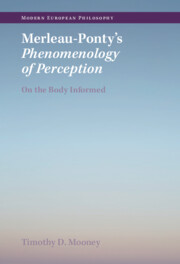Book contents
- Merleau-Ponty’s Phenomenology of Perception
- Modern European Philosophy
- Merleau-Ponty’s Phenomenology of Perception
- Copyright page
- Contents
- Acknowledgements
- Abbreviations
- Preface
- Chapter 1 Phenomenology and Objective Thought
- Chapter 2 Sensations, Associations and Explanations
- Chapter 3 Attention, Judgement and Other Work
- Chapter 4 Back to the Experience of the Body
- Chapter 5 The Body Schema and Our Skills
- Chapter 6 Motor Intentionality and Our Landscapes
- Chapter 7 Others Expressive, Engaged and Exposed
- Chapter 8 Language, Speech and Affectivity
- Chapter 9 Temporality, Subjectivity and Idealisation
- Bibliography
- Index
Chapter 7 - Others Expressive, Engaged and Exposed
Published online by Cambridge University Press: 03 November 2022
- Merleau-Ponty’s Phenomenology of Perception
- Modern European Philosophy
- Merleau-Ponty’s Phenomenology of Perception
- Copyright page
- Contents
- Acknowledgements
- Abbreviations
- Preface
- Chapter 1 Phenomenology and Objective Thought
- Chapter 2 Sensations, Associations and Explanations
- Chapter 3 Attention, Judgement and Other Work
- Chapter 4 Back to the Experience of the Body
- Chapter 5 The Body Schema and Our Skills
- Chapter 6 Motor Intentionality and Our Landscapes
- Chapter 7 Others Expressive, Engaged and Exposed
- Chapter 8 Language, Speech and Affectivity
- Chapter 9 Temporality, Subjectivity and Idealisation
- Bibliography
- Index
Summary
Here I turn to Merleau-Ponty’s account of the way we experience others in and through their attitudes and engagements. I show how he rejects all accounts of originally experiencing of the other as an analogue, whether consciously or by way of analogical appresentation. He is keenly aware of the original and intercorporeal expressivity of others, in which our being animated is already our being expressive and in which our bodies can best be compared with works of art. What is expressed is inseparable from the way it is expressed. He goes on to show that our comportment at once expresses our unique styles and our original enculturation. Though we are exposed to the gazes of others, Merleau-Ponty makes a compelling case against Sartre that we can never be objectified as mere things. The experience of the other is of a unique and transcendent existent who can always shatter our preconceptions.
Keywords
- Type
- Chapter
- Information
- Merleau-Ponty's Phenomenology of PerceptionOn the Body Informed, pp. 161 - 185Publisher: Cambridge University PressPrint publication year: 2022

